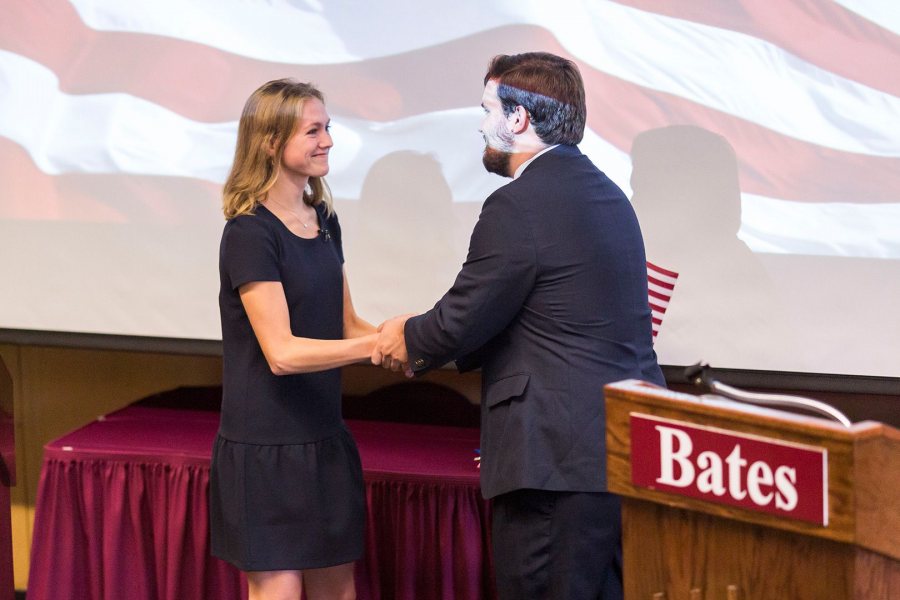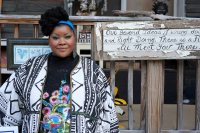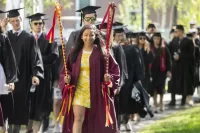
As this year’s senior speaker, Molly Chisholm of Boston is the soon-to-be Bates graduate who will speak on behalf of nearly 460 classmates at the college’s 151st graduation ceremony, on May 28.
Chisholm is a double major in economics and rhetoric, and the latter discipline has certainly helped prepare her to address more than 1,000 people on Sunday, including one surprising dimension. For a course last fall on U.S. presidential campaign rhetoric, Chisholm ran as the Republican candidate in a mock campaign for the White House.
Commencement 2017
Senior speaker Molly Chisholm will share the Commencement stage with Bates guests including keynote speaker and Harlem Children’s Zone President Geoffrey Canada and fellow honorary degree recipients U.S. Sen. Susan Collins, actor Patrick Dempsey, and art historian Wanda Corn ’62. The event will be livestreamed beginning at 9 a.m.
For the politically liberal Chisholm, who lost the Bates popular vote by two, the experience was a political and social hall of mirrors that ultimately provided inspiration for her Commencement address.
Chisholm spoke to us about the role of senior speaker, her experience as a presidential candidate, a theme she’ll explore at Commencement, and how a restaurant in Vermont helped steer her toward that theme.
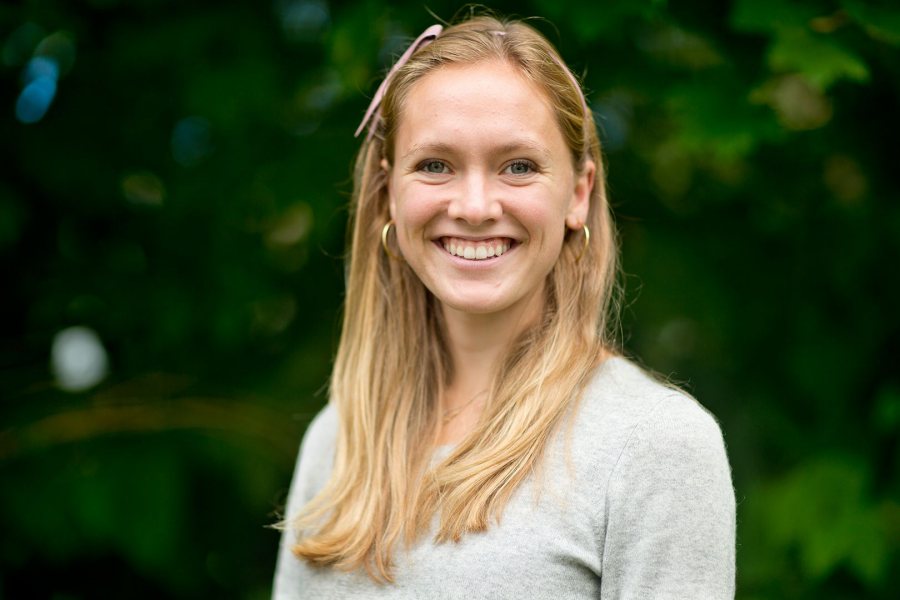
The senior speaker at Bates’ 151st Commencement is Molly Chisholm. (Phyllis Graber Jensen/Bates College)
Who nominated you for senior speaker?
The first semester of my freshman year I had an economics class with professor Lynne Lewis. She inspired me to keep going with the major because I was at first a little hesitant, and she showed me the side of econ that wasn’t all just numbers. And I had her again this past semester, and she nominated me. It was nice to get that vote of confidence from somebody that I respected.
How does the Senior Address complement the Commencement program?
One thing I’ve really worked on is that I don’t want to speak to the class as much as for the class. It’s an opportunity to channel our perspective as Bates students to the audience, and to share what it means to
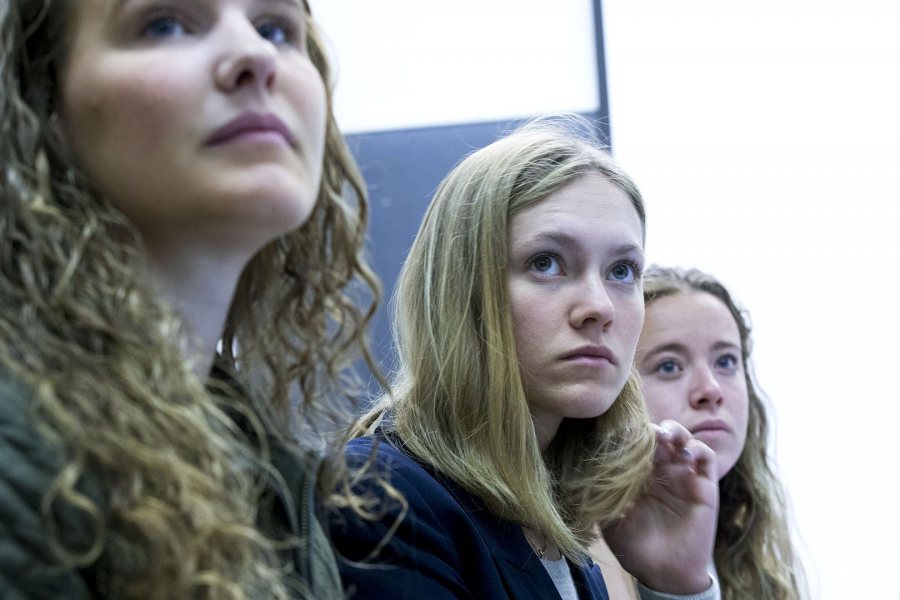
Playing the role of the GOP candidate, Molly Chisholm ’17 is flanked by campaign workers Jacqueline Forney ’18, left, and Honor Moshay ’17 during a briefing on a public health crisis introduced into a mock presidential election in fall 2016. (Phyllis Graber Jensen/Bates College)
have graduated in our class. So it’s a nice summary for the students, but it’s also a snapshot for the parents and family members who are there.
We’re not going to drop any spoilers here, but we can say your Commencement speech includes stories that bracket your Bates experience — one from AESOP during your first year, and one from your last year, from the mock election, actually.
I was done with public speaking for a little bit after the mock campaign. It’s a lot of scrutiny that I don’t really like — you obviously see it with real candidates, but when it’s you it feels very personal. But I also came away from it much stronger. I knew who I was a lot more after it, I knew how to stand up for myself, knew what I believed in.
I’ve grown a lot at Bates, so what I really wanted my Commencement speech to focus on was this bookend aspect of my class’s time here. So the speech starts off with a smaller, less impactful story, I guess, and moves on to something larger, how we’ve changed over the last four years.
And the theme tying it all together is love.
There’s a flatbread restaurant in Vermont that my family’s been going to since I was born, and it’s my favorite place. I was there one day making
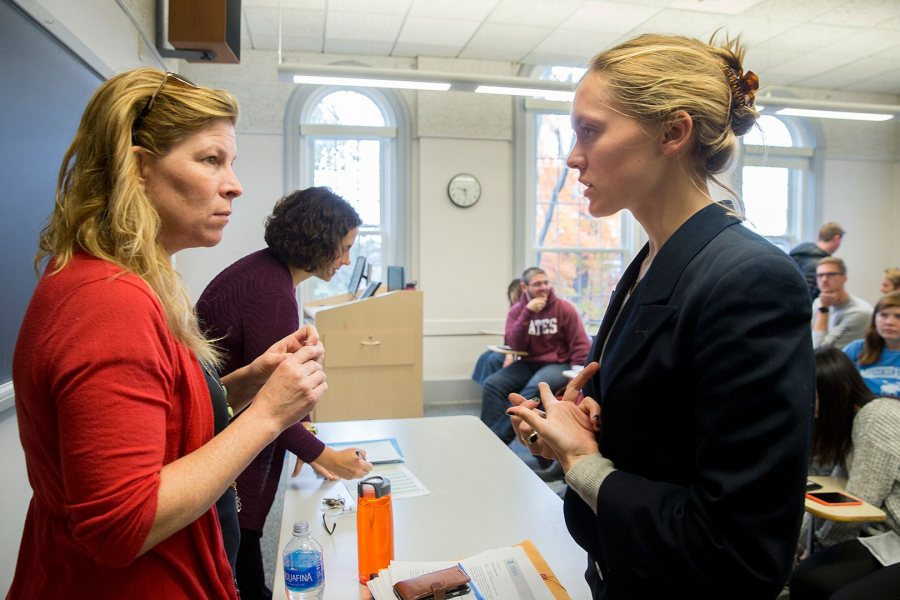
Associate Professor of Rhetoric Stephanie Kelley-Romano, at left, confers with Molly Chisholm during the fall 2017 course “Presidential Campaign Rhetoric.” As Chisholm has honed the Senior Address she’ll be giving May 28 at Commencement, Kelley-Romano has been a valued adviser. (Phyllis Graber Jensen/Bates College)
a reservation, and they have all these different signs on the walls talking about love, acceptance, humanity, and things like that. So I started thinking about that as the backbone of what I wanted to talk about.
I guess my overarching theme is “Bates as a community that’s grounded in love, and acceptance, and respect.” It’s about showing what it means to love people and what it means to spread love in the world, in a larger sense of being intellectually courageous, being confident in the morals and principles that you’re showing the world.
Your speech uses the term “love generation,” which for people who grew up in the 1960s and ’70s has a very specific meaning. Did you explore that much?
The “love generation” for me is a group of people that are just accepting, open, courageous, and smart. And that’s something that we all have the possibility to be. That doesn’t have to necessarily be tied down to any one political action or any one event in our time, but more just who you choose to be as a person, and I think that’s how Bates prepared us.
I feel that the original “love generation” was more about personal freedom, and in my speech it’s more about community, working together to make something.
It sounds like your rhetoric studies have stood you in good stead.
Yeah! For the presidential campaign I spoke a lot, so that was helpful, and then having Professor Stephanie Kelley-Romano to bounce ideas off of definitely helps when you’re writing a speech. Every comment that she’s given me, it’s been like, “Oh, of course, why didn’t I think of that!?”
Do you feel any temptation at all to bust loose when you’re up there in front of Coram, and throw your speech away and say, “Power to the people!” and all that stuff?
As senior speaker, I speak for a lot more people than just myself. I’m very honored to have been chosen to do this. It’s a great way to sum up my time at Bates, but also I want it to be a great way to sum up everyone else’s time at Bates as well. And I, probably arguably, out of all of Commencement speakers know our class the best, so speaking for everybody is a cool and exciting thing.
You’ve worked hard as a double major. You’ve run cross country and run for president. Have you had a good Bates experience?
Amazing Bates experience! I filled out my senior survey yesterday and it was very strange to look back, but also heartwarming to think about everything and answer all the questions, and be like, “Oh, wow, this is an amazing place!”
